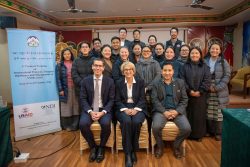

Dharamshala: The Department of Information and International Relations, Central Tibetan Administration (CTA) began conducting the “1st Protocol Training on International Protocol, Etiquette, Diplomacy and Management of VVIP visits”, a three-day training from 16-18 January 2024 in Dharamshala today.
Karma Choeying, Secretary of the Department of Information and International Relations, CTA, in his opening remarks referred to the training as a “significant step forward” in CTA’s pursuit of excellence and standardisation in ways to handle protocols, drawing upon a more “universal and refined approach.” Secretary Choeying said “the training is about creating an environment where every detail speaks of our professionalism and respect for those we engage with. From how to present ourselves to understanding the significance of protocol in our representation, each topic has been carefully curated to empower us with the knowledge and skills needed for a more polished and effective execution of our duties.”
A total of 17 civil servants of the CTA, including the personal assistants of the Speaker and the Deputy Speaker of the Tibetan Parliament-in-Exile and the Kalons (ministers), the front desk coordinators and protocol officers who are involved in defining meetings and event procedures are attending the three-day intensive training.
Over the period of three days, the protocol experts Mark Verheul and Maryse Larche Mele from Protocol International will introduce the participants on protocol in an international environment, order of precedence, best practices in high-level event management, ceremonies and components, risk management related to events, role of (social) media and security in event management, planning and managing public relations campaigns, including its measurement and evaluation and review the newly created tools for standardising visit execution with comments of leadership.
The training is funded by USAID and NDI.


